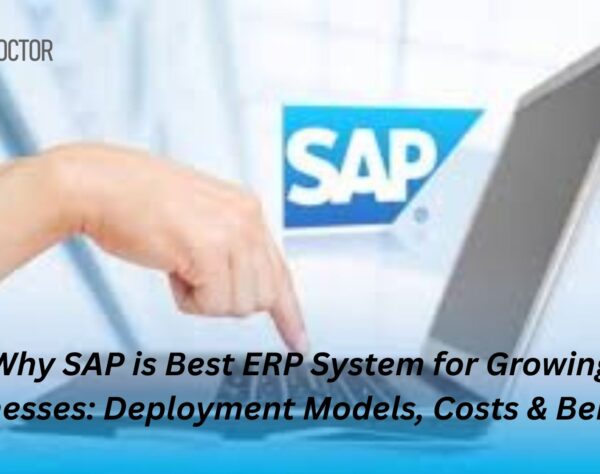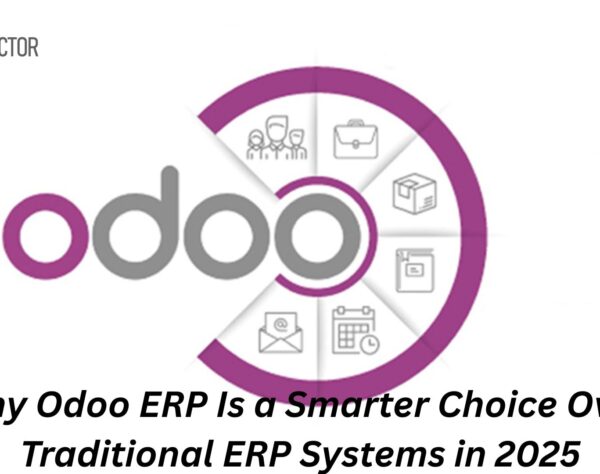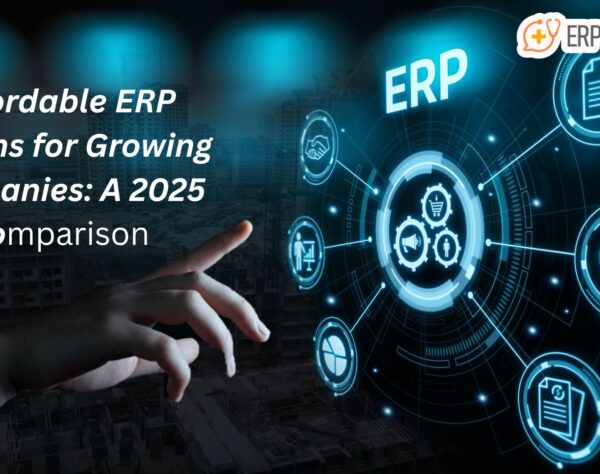
SAP B1 vs SAP HANA: What Every Business Should Know

SAP B1 vs SAP HANA: Choosing the Best Solution for Your Business
In today’s fast-paced business landscape, companies must stay ahead by embracing the right technology to streamline processes, improve decision-making, and scale effectively. SAP, a global leader in ERP solutions, offers two robust platforms — SAP Business One (SAP B1) and SAP HANA — that cater to different business needs. But how do you decide which one is the best fit for your organization?
Understanding the differences between SAP B1 and SAP HANA is crucial in making an informed choice that aligns with your business goals. While both solutions offer exceptional functionality, they are built for different types of businesses, varying in size, complexity, and operational requirements.
This comprehensive guide explores the core differences, features, advantages, and suitability of SAP B1 and SAP HANA, giving you the insights needed to choose the right platform for your business.
Demystifying SAP B1 and SAP HANA – Which One Fits Your Business Best?
Although SAP B1 and SAP HANA fall under the SAP ecosystem, they serve distinct purposes and address different business challenges. While SAP B1 focuses on streamlining operations for small and mid-sized enterprises (SMEs), SAP HANA offers advanced data analytics and high-speed processing, making it ideal for large enterprises managing complex datasets.
🎯 What is SAP B1?
SAP Business One (SAP B1) is a powerful, integrated ERP solution designed specifically for SMEs. It provides businesses with real-time insights, automates core processes, and enhances efficiency by integrating all departments under a unified platform. With a wide range of features, SAP B1 allows businesses to manage accounting, inventory, sales, purchasing, and customer relationships seamlessly.
✅ Key Features of SAP B1:
- End-to-end business management for SMEs.
- Available on both Microsoft SQL Server and SAP HANA databases.
- Real-time reporting and analytics for better decision-making.
- Customizable modules tailored to industry-specific needs.
- Affordable and easy to implement, making it ideal for growing businesses.
🚀 What is SAP HANA?
SAP HANA is a cutting-edge, in-memory database and analytics platform that processes massive volumes of data in real time. It serves as the underlying engine for SAP’s next-generation ERP solutions, including SAP S/4HANA and SAP B1 powered by SAP HANA.
By leveraging columnar storage and advanced processing algorithms, SAP HANA delivers unmatched speed and performance, making it the go-to choice for enterprises that require real-time data analysis, predictive analytics, and AI-driven insights.
✅ Key Features of SAP HANA:
- Real-time data processing for faster decision-making.
- Advanced analytics, predictive modeling, and AI capabilities.
- Supports IoT, machine learning, and big data applications.
- High scalability and performance for complex business processes.
- Enhanced security and compliance features for data protection.
🔥 SAP B1 vs SAP HANA: Core Differences That Matter
📊 1. Database and Architecture
- SAP B1: Runs on Microsoft SQL Server or SAP HANA, giving businesses the flexibility to choose based on their needs.
- SAP HANA: Serves as an advanced in-memory database that powers SAP S/4HANA and SAP B1, offering faster data processing and real-time analytics.
⚡ 2. Target Audience and Business Size
- SAP B1: Best suited for small and mid-sized businesses seeking a cost-effective ERP solution to manage day-to-day operations.
- SAP HANA: Designed for large enterprises handling high data volumes and requiring advanced analytics, predictive insights, and complex business processes.
🔎 3. Speed, Performance, and Data Processing
- SAP B1: Offers reliable performance for SMEs but may experience slower response times when handling large datasets, especially on SQL.
- SAP HANA: Processes large datasets in milliseconds, providing high-speed performance, making it ideal for data-heavy enterprises.
📈 4. Advanced Analytics and Business Intelligence
- SAP B1: Provides basic reporting and analytics with enhanced capabilities when running on SAP HANA.
- SAP HANA: Enables real-time data analysis, advanced reporting, predictive analytics, and machine learning, delivering actionable insights instantly.
💰 5. Cost and Licensing
- SAP B1: More affordable for SMEs with flexible pricing based on user licenses and selected modules.
- SAP HANA: Higher initial investment and operational costs, making it better suited for larger organizations with higher IT budgets.
🔄 6. Customization, Scalability, and Flexibility
- SAP B1: Provides moderate customization and scales efficiently for growing SMEs but may require migration to SAP S/4HANA for larger enterprises.
- SAP HANA: Offers high scalability and complex customization capabilities, making it a perfect choice for enterprises managing multiple subsidiaries and global operations.
🔐 7. Security and Compliance
- SAP B1: Provides standard security features with basic data protection.
- SAP HANA: Ensures enhanced security protocols, compliance with industry regulations, and advanced encryption standards to protect sensitive business data.
Why SAP B1 Might Be the Best Fit for Your Business
✅ When to Choose SAP B1
- If you are a small or mid-sized business looking for a budget-friendly ERP solution that scales as your business grows.
- If you want to streamline processes across departments without requiring advanced data analytics.
- If your business has moderate operational complexity and does not require real-time data analysis.
📚 Advantages of SAP B1:
- Affordable and easy to implement.
- Centralized control over business processes.
- Provides real-time visibility into operations.
- Supports moderate growth and complexity.
Why SAP HANA Might Be the Right Choice for Your Enterprise
✅ When to Choose SAP HANA
- If your organization deals with large datasets and requires real-time data processing for enhanced decision-making.
- If your business relies on AI, IoT, and advanced analytics to drive innovation and competitiveness.
- If you are a large enterprise managing complex operations and seeking scalability with a high-performance database.
📚 Advantages of SAP HANA:
- Ultra-fast processing and real-time insights.
- Supports AI, IoT, and big data applications.
- Advanced security and compliance features.
- High scalability for enterprise-level growth.
📊 SAP B1 vs SAP HANA: Which Delivers Better ROI?
📈 SAP B1 ROI Factors
- Lower upfront investment with faster implementation.
- Ideal for businesses focusing on cost-effective growth.
- Easier to manage and maintain for SMEs.
⚡ SAP HANA ROI Factors
- Higher initial costs but delivers long-term value through advanced analytics.
- Reduces operational complexity by automating decision-making.
- Provides faster insights, improving overall business performance.
💡 How SAP B1 and SAP HANA Complement Each Other
Although SAP B1 and SAP HANA serve different purposes, they can work together effectively. SAP B1 powered by SAP HANA combines the best of both worlds, offering SMEs a cost-effective ERP with enhanced performance, real-time analytics, and faster data processing.
For businesses seeking growth beyond standard ERP functionalities, migrating from SAP B1 on SQL to SAP B1 on HANA ensures improved operational efficiency and scalability.
📝 SAP B1 vs SAP HANA: Real-World Use Cases
Case Study 1: SAP B1 for an SME in Retail
A mid-sized retail chain adopted SAP B1 to manage its inventory, sales, and customer relationships more effectively. The company experienced a 25% reduction in operational costs and improved customer satisfaction through automated order processing and real-time reporting.
Case Study 2: SAP HANA for a Large Manufacturing Enterprise
A global manufacturing company leveraged SAP HANA to analyze production data and optimize supply chain processes. Real-time insights helped the company reduce downtime, increase production efficiency, and minimize costs by 18%.
🎁 Final Verdict: SAP B1 vs SAP HANA – Which One Should You Choose?
Choosing between SAP B1 and SAP HANA depends on your organization’s size, complexity, and growth goals. While SAP B1 is a budget-friendly solution that empowers SMEs to manage operations efficiently, SAP HANA provides unparalleled speed, advanced analytics, and scalability for large enterprises managing complex datasets.
Evaluate your current business processes, data requirements, and future growth plans to make an informed decision that drives long-term success.
📚 FAQs
1. Can SAP B1 run on SAP HANA, and how does it benefit SMEs?
Yes, SAP B1 can run on SAP HANA, offering improved performance, faster data processing, and real-time analytics compared to the SQL version.
2. What is the main difference between SAP B1 and SAP HANA?
SAP B1 is a complete ERP solution for SMEs, while SAP HANA is an advanced in-memory database that powers SAP applications and analytics.
3. Is SAP HANA suitable for small businesses or only for enterprises?
SAP HANA is designed primarily for large enterprises, but SMEs can benefit from using SAP B1 powered by SAP HANA for enhanced speed and insights.
4. Can SAP B1 scale with business growth, or will migration be required?
SAP B1 scales well for growing SMEs, but larger enterprises may eventually need to migrate to SAP S/4HANA for more complex operations.
5. What are the implementation timelines for SAP B1 vs SAP HANA?
SAP B1 typically takes 2-6 months to implement, while SAP HANA implementations for large enterprises may take longer, depending on complexity.
6. Does SAP HANA support advanced AI and machine learning applications?
Yes, SAP HANA integrates seamlessly with AI, IoT, and machine learning applications, making it ideal for data-driven enterprises.
7. How does SAP B1 on HANA differ from SAP B1 on SQL?
SAP B1 on HANA offers faster data processing, advanced analytics, and predictive insights, whereas SAP B1 on SQL provides standard ERP functionality.
8. Is SAP HANA more expensive than SAP B1, and is the investment worth it?
Yes, SAP HANA has higher upfront costs, but it delivers long-term value by enhancing data processing, analytics, and decision-making capabilities.
9. Can SAP B1 and SAP HANA be deployed on the cloud?
Yes, both SAP B1 and SAP HANA offer cloud deployment options, providing flexibility for businesses to choose between on-premise or cloud hosting.
10. How does SAP HANA improve decision-making for large enterprises?
SAP HANA provides real-time insights, predictive analytics, and AI-powered decision support, enabling data-driven decision-making at scale.







